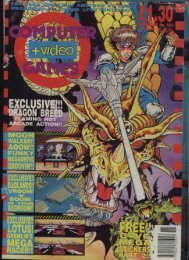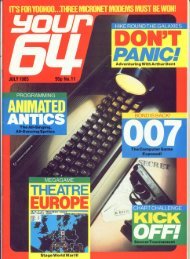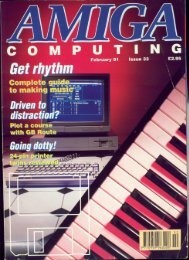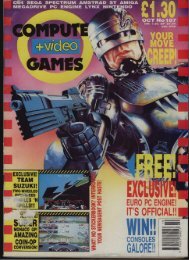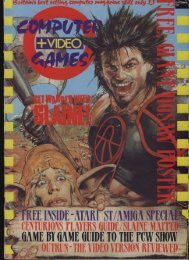Computer + Video Games - Commodore Is Awesome
Computer + Video Games - Commodore Is Awesome
Computer + Video Games - Commodore Is Awesome
Create successful ePaper yourself
Turn your PDF publications into a flip-book with our unique Google optimized e-Paper software.
How "mature" are you? "For mature<br />
readers" is a label seen more and more<br />
often nowadays on American comicbooks.<br />
It's a reaction by the comic<br />
publishers to a fear that some of their<br />
stronger material (sex, violence, bad<br />
language and other sure-fire sales<br />
gimmicks) will come under the scrutiny<br />
of the self-appointed moral crusaders<br />
miming rampage in America today.<br />
Some comic companies, it seems,<br />
have panicked at the idea of their<br />
comics being censored, and so have<br />
tried to introduce their own system of<br />
advisory "ratings". Hence "for mature<br />
readers", the comic-book equivalent of<br />
an X-certificate (though you're not<br />
likely to see it on the X-Men!).<br />
Not everybody in the comics business<br />
is quite so convinced about the need for<br />
a ratings system to stop adult material<br />
getting into childish hands. For<br />
instance, when DC announced that its<br />
books would carry advisory ratings,<br />
four of the best-known names in comics<br />
replied that in that case they wouldn't<br />
be doing any more new work for DC.<br />
The four were Frank Miller, Alan<br />
Moore, Howard Chaykin (see last<br />
month's C+VG) and Mary Wolfman;<br />
DC subsequently backed down.<br />
It's a stupid argument, of course.<br />
Everyone's got their own standards as<br />
to what's acceptable and what isn't.<br />
And you might well ask, who are they to<br />
tell me what I can and can't read?<br />
Red herring or not, though, it's a<br />
reminder that you're never too old for<br />
comics— or, put it another way, there's<br />
more to comics than just superheroes.<br />
As I've said before in this column,<br />
comics is a medium where you can tell<br />
any kind of story for any kind of<br />
audience. That fact is gradually sinking<br />
in - with both publishers and the<br />
reading public.<br />
Not that there's anything wrong with<br />
the ideas of superheroes— and there's<br />
some wonderful work being done there<br />
right now. But there's also some<br />
genuinely "mature" ("for mature<br />
readers", remember?) non-superhero<br />
storytelling going on.<br />
For instance, you'll find "adult"<br />
themes and artistic sophistication in<br />
these:<br />
• Love & Rockets (book one, f.5.95,<br />
published by Titan Books; book two out<br />
soon). I must immediately declare a<br />
prejudice: I think this book is a<br />
masterpiece. It's the work of Jaime<br />
Hernandez who, along with brothers<br />
Gilbert and Mario, produces a<br />
128<br />
wonderful comic magazine called Love<br />
& Rockets, from which the stories in<br />
this volume are reprinted.<br />
It's described by the publishers as<br />
"The hilarious adventures of Maggie,<br />
-Aar<br />
.<br />
••••••••'' • • • • '•••'<br />
41,010.. •••• ••••• ,•••••••••••.• VW.<br />
an.. O A '<br />
•••• ••••••., ,<br />
0 1 0<br />
WAII00/1<br />
,<br />
•.••<br />
Hopey and their friends as they endure<br />
the perils of post-punk romance. Dark<br />
glasses, cars, dieting, lady wrestling,<br />
mechanics, sex, rockets, heartaches,<br />
rock and roll and happiness in the<br />
nuclear age."<br />
If you're still reading after that, and<br />
haven't yet dashed out to procure a<br />
copy, let me add that Jaime Hernandez<br />
masterfully blends earthily realistic<br />
dialogue with economic but irresistable<br />
drawings to create a cast of characters<br />
you can't help but care about — Maggie<br />
and Hopey in particular. As you<br />
progress through the book you find<br />
yourself sharing their mundane day-today<br />
concerns while feeling slightly<br />
disorientated by some of the<br />
background details — the existence of<br />
dinosaurs in their world, for instance,<br />
and Maggie's expertise as, of all things,<br />
a rocket engineer.<br />
Reading this back, I suspect that I've<br />
failed to convey the flavour of Love &<br />
Rockets in the slightest. So you'll just<br />
have to accept my recommendation:<br />
buy this book or be seriously<br />
unfulfilled.<br />
• Heartbreak Soup (Titan Books,<br />
1 L.5.95). In a way, this is a companion<br />
volume to Love & Rockets — it's<br />
reprinted from the same magazine and<br />
is entirely the work of another<br />
Hernandez brother, Gilbert. (The two<br />
books are attractively designed by Rian<br />
Hughes to look like a uniform edition.)<br />
Gilbert's work sits neatly alongside<br />
Jaime's, but on closer examination it is<br />
a more complex blend. The ubiquitous<br />
Alan Moore remarks in the<br />
introduction that the influences of both<br />
Japanese and European comics are<br />
visible here. And the subject matter is<br />
far more relentlessly "normal" than<br />
Jaime's semi-fantasy world. It might<br />
seem strange to speak of life in an<br />
• • •• m .<br />
a• • • • -• • 01<br />
impoverished Mexican village as<br />
"normal" (unless that happens to be<br />
where you live, otcourse), but that's<br />
the effect of Gilbert's technique. By<br />
writing, as it were, in a dull monotone<br />
he makes us accept his funny-looking<br />
cartoony characters as absolutely real.





